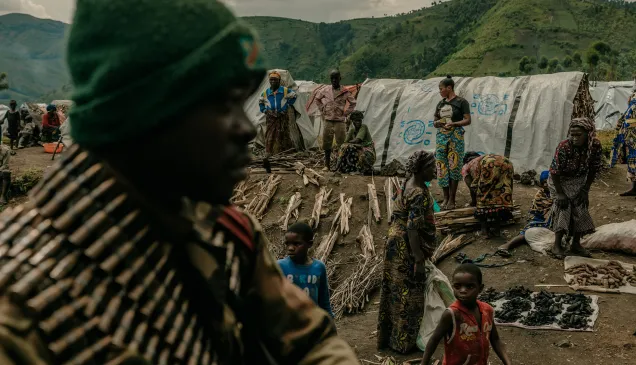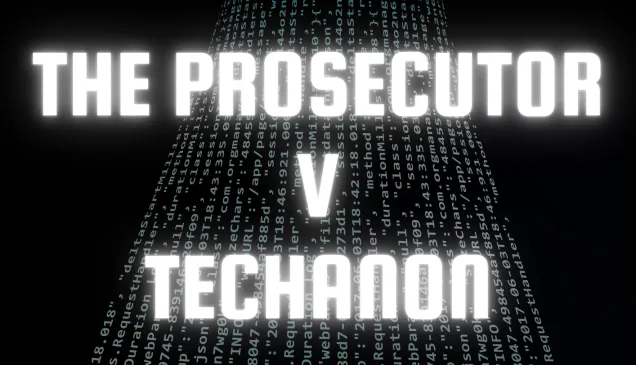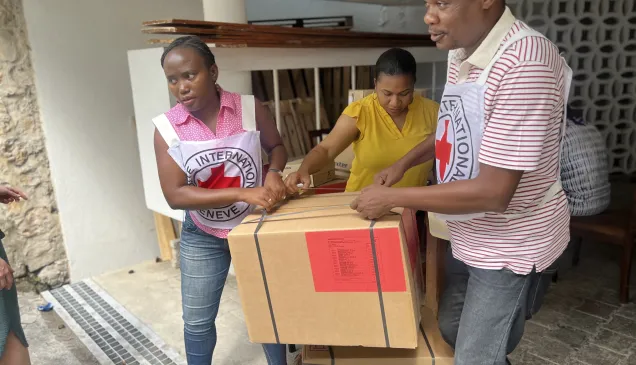ICRC: Strengthening solidarity and promoting peace through soft power
Speech given by Mr. Peter Maurer, President of the International Committee of the Red Cross, at Antalya Diplomacy Forum
Excellencies, distinguished guests,
The call of the Antalya Diplomacy Forum to "recode diplomacy" and the attention of this panel on soft power is urgently needed. Hard power expressed through military operations is dominating the international arena, with huge costs for people, States and the international system.
We meet today against the backdrop of suffering and despair of civilians in Ukraine. The humanitarian situation is desperate and worsening by the hour. Amid the violence, the International Committee of the Red Cross continues to be present in-country and is scaling up our response.
But sadly, the misery in Ukraine is only part of the full picture of humanitarian crisis. Whether Afghanistan, Ethiopia, Yemen, Syria, the Sahel and Lake Chad regions, record numbers of people are affected by conflict and violence.
Today, in more than fifty situations of armed conflict around the world, we see violations of international humanitarian law, leading to the death and disappearance of civilians, the destruction of their homes, hospitals, schools, water and electricity supplies, and the separation of families.
The bottom line is: when diplomacy and soft power fail and when hostilities between States dominate: it is civilians who suffer.
In such a world – what can be done to influence parties to conflicts, and those that support them, to end the suffering?
Today, I bring key recommendations on how we can strengthen soft power and collectively "recode diplomacy" in a war-torn and violent world:
Firstly, respect for international humanitarian law provides a pathway out of endless cycles of hostilities and suffering.
Designed by States and militaries themselves, international humanitarian law provides a minimum consensus amongst belligerents to maintain humanity even in the height of hostilities and to contain the negative impact of conflict on individuals, societies, and States.
The ICRC sees that even in the most deadly and polarizing conflicts, shared humanitarian objectives can help parties make minimal agreements, whether on evacuating the wounded, reconnecting separated families, the dignified treatment of prisoners of war or the respectful exchange of human remains.
IHL is a powerful instrument for healing the wounds of war and making pathways to reconciliation, a role that is recognized by parties to conflict and in resolutions of the UN Security Council.
Secondly, international humanitarian law is a living body of law, designed to provide guidance on the gritty realities of war. It can only play its role if it is accompanied by efforts to change behavior.
Vitally, the law must not become a cynical tool for negotiation and wielded for hard power objectives but used as a common effort to change behavior of belligerents so that humanity is preserved.
Across conflicts, the ICRC works hard to build relations with all parties to armed conflicts and those who influence them. Currently we have dialogue with militaries and police in over 110 countries worldwide as well as more than 460 non-state armed groups.
We are also adapting our diplomatic strategies to reflect the changing battlefields when it comes to partnered warfare. Today wars are nearly always fought with support from States to the local parties – whether in coalition, through local proxies, financial or material support. The humanitarian dimension is seldom considered in these partnerships, yet these supporting States can be highly influential in setting humanitarian protections.
The ICRC has designed an agenda for action, based on our analysis from conflicts, which sets out practical steps States can take to help parties they support behave in ways that comply with the law.
This includes, for instance, ensuring that international humanitarian law is known by all those fighting on the ground, that prisoners of war are treated humanely, that people do not disappear, that mortal remains are collected in a dignified manner. Or for instance that States supplying weapons carefully assess the risk that these could be used to commit violations of IHL and take appropriate measures to prevent such violations and reduce humanitarian consequences.
My third recommendation today – is that soft diplomacy needs networks of influencers.
Throughout the Red Cross and Red Crescent Movement, we are proud to have champions that advocate for humanity and for neutral, impartial and independent humanitarian action. We are grateful to the work of patrons and supporters, including Your Excellency, who joins a long tradition of First Ladies as supporters of the Red Cross and Red Crescent and powerful voices for humanity.
Advocates of humanity provide a strong soft-power-line-of-defence against the pitfalls of military and economic coercion which, as we see time and again, only results in creating further tensions and resentments.
Four, ICRC's experience on changing behaviour through respect of the law has sharpened our awareness of consensus and trust-building as core instruments of soft power.
The law is applicable to all belligerents and so ICRC speaks with all those who can influence and promote norms, helping to provide respect for the law, and to create trust.... trust which allows for more peaceful societies.
While States and non-state armed groups are our key interlocutors, increasingly, we also engage with a broader circle of influential stakeholders from private military and security companies as well as religious influencers, civil society organizations and academia. Over a decade we have developed a platform for IHL and Islamic law to highlight the commonalities of the two legal systems and as an effort in consensus and trust-building.
Five, soft power must start where hard power has caused the greatest destruction - in communities affected by war.
As the Red Cross Red Crescent Movement, we work in close proximity to communities, listening to their needs, their expectations, hopes and fears and try to design the most relevant response. We support people's agency as experts of their own situation with skills, capacities and enormous resilience.
Even more importantly in a world with diminishing trust in governments and institutions, we must also recognize that soft power is community power.
Six, Humanitarian soft power needs to leverage technology and innovation:
Today again we experience the terrible effect of hard power and coercion in sophisticated military operations, high-tech weaponry; and the spread of disinformation and hate speech in many conflicts.
The transformational power of digitalization needs also to be harnessed for better humanitarianism - to deliver better, faster or more cost-efficient services to populations. For example through telehealth services, digital payments, artificial intelligence to match identities in the search for missing family members, or virtual reality tools for instance when training armed forces on the law of war.
Excellencies, guests
The Red Cross Red Crescent Movement, with the ICRC's specific mandate on conflict and violence, finds itself at the crossroads of soft and hard power.
The Movement was designed to counter the problems of hard power through the tools of soft power, humanitarian diplomacy and humanitarian action. In this sense, the Movement is the pragmatic representation of soft power even before the term was coined. Today we continue to explore alliances and partnerships with all those who agree that wars have limits and that there is a world beyond hard power to be created.
Thank you.



